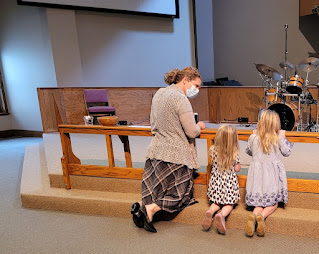Worship Matters to Kids
matters for kids. Most people expect me to give religious reasons: God is worthy of worship; worship is part of discipleship. And, yep, that’s all true. But when it comes to worship and children, I find myself mostly giving the perspective of a developmental psychologist (you know, that other job I do).
Here’s what I shared recently with a group of parents:
1. Patterns, rhythms, and rituals build identity, create a sense of security, and orient/ground us. Research for over 70 years (yes, that many!) has shown that children thrive when their grownups provide rituals and routines. Worship is a powerful ritual that reminds kids, “you are part of something bigger.” Family routines and rituals may improve family relationships and health (apa.org)
2. Worship is a sensory-rich experience with music, liturgy, readings. Little brains are stimulated when in they are enmeshed in environments like this. Except for theater, I can’t think of another environment that provides this type of brain stimulation to kids.
3. Boredom is good. Anyone else remember counting the ceiling tiles in worship as a kid? We might even blame our parents for forcing us to experience something that wasn’t designed for children. However, a growing body of research shows this next generation is not learning how to process negative emotion—boredom, anxiety, and sadness. (We can thank screens and a barrage of marketing/entertainment targeted to kids’ maturing brains. Grrrr.) Boredom is important to feel; it forces us to figure out how to manage negative feelings. Counting ceiling tiles, paging through the hymnal, noticing other people’s shoes are the roots of mindfulness. Supporting Our Children Through Negative Emotions (psychalive.org)
4. If you go to the right kind of church, your kids are reminded weekly they belong, are included, are beloved, and are precious. Now I know many of you grew up in churches with different messages: you heard about your sinfulness and depravity. But lots of different kinds of churches exist. Find a church that tells your child they are worthy of God’s love so when they start to feel insecure, they can recall those voices telling them, "You are precious."
5. Kids learn community in worship. They have to navigate a busy space along with others who might have walkers or a wheelchair. They have to interact with others differently than themselves. They have to wait in line with people of all ages to get their treat. I could go on and on, so I’ll probably write more about this later.
More and more I hear of kids wanting to come to worship, but parents find it hard to commit. Parents often say, “I want my child to be able to make that choice for themselves,” but then when the child makes the choice, the parents struggle finding their own way. Here's the deal though: kids aren't the only ones who benefit. :-)
And because going to worship requires a transition from bed… to the car… and into a new building, kids complain about going. Anybody notice kids are terrible at transitions!? Parents constantly have to pick which activities in their children's lives are requirements, expectations, and options. Going to school is not an option for most families. Teeth brushing is not an option for most families, but it might be for some. Eating breakfast might be an option or might be an expectation. Just like every other activity in your child’s life, you decide: will worship be an option or expectation or requirement? Are the benefits worth the struggle with the transition?




Comments
Post a Comment